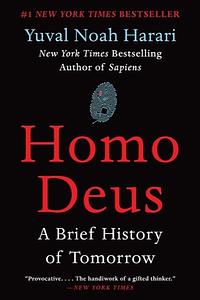Take a photo of a barcode or cover
challenging
informative
medium-paced
challenging
informative
medium-paced
I give it 10 stars out of 5
The best book I have ever read in my life!
Wow. It has just so much interesting information
The best book I have ever read in my life!
Wow. It has just so much interesting information
challenging
informative
reflective
medium-paced
Harari’s predictions of how humanity will look in just a few decades are fascinating. He presents many ideas and backs them up with evidence that these changes have already begun. However, this book assumes a lot about what a human being would be willing to leave behind.
Many times, the book seems totally disconnected from regular human beings. There is a sense that humanity’s extinction/evolution into Homo Deus is inevitable, and we will be totally different, godlike creatures. But even given technological advances and modifications to our bodies, brains, and consciousness, I don’t believe we will lose our sense of humanity any time soon.
He makes the argument that we will soon be as far from Homo Sapiens as we are currently far from the Neanderthals. That might be true, but we still like to sit by a fire. We’re still awed by the stars. Distant as we may be from our previous form, we didn’t completely lose our connection to that form. I think the same will happen with Homo Deus. We will (and already do) choose to augment ourselves, but not at the expense of the things we like about being human. No matter what, we won’t all fuse with computers and forgo the simple enjoyments of Homo Sapiens.
Many times, the book seems totally disconnected from regular human beings. There is a sense that humanity’s extinction/evolution into Homo Deus is inevitable, and we will be totally different, godlike creatures. But even given technological advances and modifications to our bodies, brains, and consciousness, I don’t believe we will lose our sense of humanity any time soon.
He makes the argument that we will soon be as far from Homo Sapiens as we are currently far from the Neanderthals. That might be true, but we still like to sit by a fire. We’re still awed by the stars. Distant as we may be from our previous form, we didn’t completely lose our connection to that form. I think the same will happen with Homo Deus. We will (and already do) choose to augment ourselves, but not at the expense of the things we like about being human. No matter what, we won’t all fuse with computers and forgo the simple enjoyments of Homo Sapiens.
informative
reflective
tense
medium-paced
This book is indeed provocative and a must read in this lifetime. It makes me understand the importance of data in technology. It is somewhat scary to think about the AI taking over us. But it might not be possible at this point of time. This may happen by the time most of us is no longer existing in this world. Good luck to the future generation.
I read Harari’s Sapiens a few years ago and found it a refreshing take on human history and where we came from. In Home Deus, Harari attempts to show us not only where we came from but where we’ll end up going, with a healthy disclaimer that no one actually knows what’s going to happen.
As a casual history enthusiast, I enjoy reading Harari’s books not only because they offer a new perspective that is different from what we usually go through, but also because he ends up writing exquisitely at times. The web of words he weaves has a lilt and a harmony to it that is not usually found in books written by historians and philosophers. He makes you aware of certain facts that seem obvious but have hitherto been obscured to you because you never thought about them deeply – the agricultural revolution being a religious one for example. It’s doubly enjoyable to the casual reader because of the multidisciplinary topics that are covered in the books and how they’re artfully melded together for the layman to read and enjoy. I think the book is quoteworthy as well – “We read history to liberate ourselves from it” – not something we discussed in history class at university. I think my unfortunate friends will be exposed to my Harari quote-dropping for the next few days.
Some passages in the book are brilliant and cause you to stop reading and absorb something that is bigger and has much wider implications than the mere words on the page itself. You suddenly start connecting things, making assumptions and discovering the nature of human existence. Curiously, this is not always connected to what the chapter is discussing at the moment – the passage will talk at length about something else but your brain will kick into overdrive itself. I found the book to be highly conducive to thought.
Content wise, I had some concerns. Unfortunately, as with Sapiens, I found the book to be overly reductive at times. It often seems to me that Harari misses the forest for the trees and follows a reductive approach in his reasoning. I generally found myself agreeing with the arguments but then there are small passages where he argues something technical that leave me less than impressed. Neurotransmitters cause PTSD, depression and stress instead of bombs, war and poverty. Kind of disingenuous. Biologically, that is absolutely correct but the very essence of life is reaction to a stimulus. Remove the stimulus and the action doesn’t take place. It’s like saying you don’t jerk your hand away because fire is hot but because electrical signals cause a contraction in your muscles. Absolutely true. Absolutely missing the point. There are times where a bit of clarification in word usage wouldn’t go amiss either. Harari redefines what he means by religion and keeps using the word in the context of this new definition – the word “belief system” might have saved me some wondering in the earlier chapters.
While the book made for fantastic reading and was filled with great nuggets, I found the final third to be lacking and quotidian. Perhaps I expected Harari to cover some new ground but it seemed like we were going over things that I had already been exposed to in Brave New World, and for the anime fans – Psycho Pass. The ending isn’t as satisfying either as we cover old ground and too-far-in-the-future ideas.
Nevertheless, while I found Sapiens overly biological and not sociological enough, reading Homo Deus made me understand the last book a bit better. It made for exciting reading and opened me up to new ideologies and definitions I hadn’t heard of or properly thought of before. The abrasive style of writing is also quite interesting and while I found myself not agreeing with everything, it was still made for worthwhile reading if merely for the exposure to some great ideas and different way of thinking. Recommend.
As a casual history enthusiast, I enjoy reading Harari’s books not only because they offer a new perspective that is different from what we usually go through, but also because he ends up writing exquisitely at times. The web of words he weaves has a lilt and a harmony to it that is not usually found in books written by historians and philosophers. He makes you aware of certain facts that seem obvious but have hitherto been obscured to you because you never thought about them deeply – the agricultural revolution being a religious one for example. It’s doubly enjoyable to the casual reader because of the multidisciplinary topics that are covered in the books and how they’re artfully melded together for the layman to read and enjoy. I think the book is quoteworthy as well – “We read history to liberate ourselves from it” – not something we discussed in history class at university. I think my unfortunate friends will be exposed to my Harari quote-dropping for the next few days.
Some passages in the book are brilliant and cause you to stop reading and absorb something that is bigger and has much wider implications than the mere words on the page itself. You suddenly start connecting things, making assumptions and discovering the nature of human existence. Curiously, this is not always connected to what the chapter is discussing at the moment – the passage will talk at length about something else but your brain will kick into overdrive itself. I found the book to be highly conducive to thought.
Content wise, I had some concerns. Unfortunately, as with Sapiens, I found the book to be overly reductive at times. It often seems to me that Harari misses the forest for the trees and follows a reductive approach in his reasoning. I generally found myself agreeing with the arguments but then there are small passages where he argues something technical that leave me less than impressed. Neurotransmitters cause PTSD, depression and stress instead of bombs, war and poverty. Kind of disingenuous. Biologically, that is absolutely correct but the very essence of life is reaction to a stimulus. Remove the stimulus and the action doesn’t take place. It’s like saying you don’t jerk your hand away because fire is hot but because electrical signals cause a contraction in your muscles. Absolutely true. Absolutely missing the point. There are times where a bit of clarification in word usage wouldn’t go amiss either. Harari redefines what he means by religion and keeps using the word in the context of this new definition – the word “belief system” might have saved me some wondering in the earlier chapters.
While the book made for fantastic reading and was filled with great nuggets, I found the final third to be lacking and quotidian. Perhaps I expected Harari to cover some new ground but it seemed like we were going over things that I had already been exposed to in Brave New World, and for the anime fans – Psycho Pass. The ending isn’t as satisfying either as we cover old ground and too-far-in-the-future ideas.
Nevertheless, while I found Sapiens overly biological and not sociological enough, reading Homo Deus made me understand the last book a bit better. It made for exciting reading and opened me up to new ideologies and definitions I hadn’t heard of or properly thought of before. The abrasive style of writing is also quite interesting and while I found myself not agreeing with everything, it was still made for worthwhile reading if merely for the exposure to some great ideas and different way of thinking. Recommend.
Це, мабуть, найбільш вражаюча книжка, що я прочитала за рік.
Вона розрахована на широку аудиторію, тому написана доступною мовою, незважаючи на достаток наукових фактів і дат. Є книжки, в яких можна підкреслити два-три цікавих місця, — так от, в «Людині розумній» мені хотілося виділити маркером принаймні половину сторінок.
Від еволюції людини Харарі переходить до еволюції суспільства та знаходить цікаві пояснення багатьом аспектам культури. Він змусив мене подивитися на концепцію грошей, віру в права людини та рівноправ'я з нового боку. Втім, деякі моменти не могли не напружити. Як на мене, Харарі наділяє певні прошарки суспільства, а саме власників великих торговельних компаній, тією свідомістю та зловмисністю, якої в них насправді не було. Він малює їх майже карикатурними лиходіями, які прокинулися одного дня та поставили собі «зруйнувати інститут родини».
Якщо не брати до уваги деякі особисті переконання автора, які він намагається просунути в своїй книжці, я гарантую, що ви не пошкодуєте витраченого часу.
Вона розрахована на широку аудиторію, тому написана доступною мовою, незважаючи на достаток наукових фактів і дат. Є книжки, в яких можна підкреслити два-три цікавих місця, — так от, в «Людині розумній» мені хотілося виділити маркером принаймні половину сторінок.
Від еволюції людини Харарі переходить до еволюції суспільства та знаходить цікаві пояснення багатьом аспектам культури. Він змусив мене подивитися на концепцію грошей, віру в права людини та рівноправ'я з нового боку. Втім, деякі моменти не могли не напружити. Як на мене, Харарі наділяє певні прошарки суспільства, а саме власників великих торговельних компаній, тією свідомістю та зловмисністю, якої в них насправді не було. Він малює їх майже карикатурними лиходіями, які прокинулися одного дня та поставили собі «зруйнувати інститут родини».
Якщо не брати до уваги деякі особисті переконання автора, які він намагається просунути в своїй книжці, я гарантую, що ви не пошкодуєте витраченого часу.
challenging
informative
reflective
tense
medium-paced
challenging
informative
inspiring
reflective





